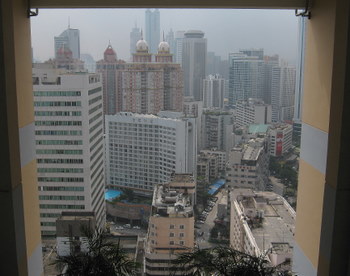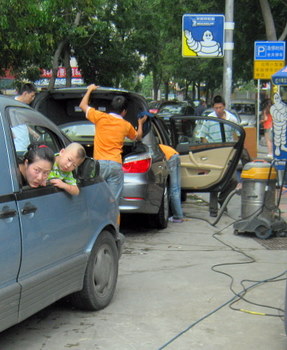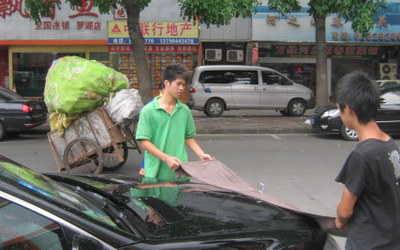
NEXTINSIGHT BRINGS YOU a series of interviews with both locals and expatriates who call the southern Chinese metropolis of Shenzhen both their workplace and home.
Our aim is to offer insights into what could be The Next Big Thing – Shenzhen – a city whose GDP growth and population have outpaced those of its richer neighbor, Hong Kong, seemingly since people began paying attention to the big and little dragons’ economic performance in the first place.
We also hope to bring a series of revealing snapshots on just what it takes for non-locals, as well as native Chinese, to live and work here, and thrive while doing so.
A common thread linking these industrious expats and successful locals together is how they have taken the best from their diverse backgrounds to make a name for themselves in what is an oftentimes faraway place like Shenzhen.
Things are rapidly changing in this dynamic 10-mln strong city which sports the highest percentage of non-local born residents of all the country’s major population centers.
London, New York and San Francisco of old – which in Chinese translates as “Old Gold Mountain” due to the belief by some in centuries past that the streets of America were indeed paved with the stuff.—were the destination of millions of Cantonese, Fujianese and other immigrants from Cathay looking to find their fortune in far-off, mysterious and more prosperous lands.
Now the hosts are becoming the guests as more and more foreigners – and successful Chinese from far flung provinces – are seeking to improve their lot in Shenzhen.
In this installment, we meet Mr. Paul Adlem, a forty-something native of London, UK who has been travelling to and from Shenzhen numerous times for the past several years in his capacity as manager of Valve Control Systems for Helsinki-listed shipping logistics firm CargoTec.
As much as NextInsight would like to give virtual airspace to gung ho glowing takes on the city of Shenzhen from both expats and locals alike, this week we are once again meeting a foreigner with a few bees in his bonnet when he gets round to critiquing some of the aspects of China’s most crowded – and by some measures, its most populous – city.
|
NextInsight: As a businessperson frequently visiting Shenzhen, what were your original impressions upon getting off the plane at Bao An Airport?
Mr. Adlem: I would have to say I was taken aback at how developed the city was. I know that this is a frequent reply from first-time visitors to China, with the gawking and oohing and aahing at all the flashy new skyscrapers, gridlock, modern facilities and of course the crowds, but I guess I am no exception.
I was very surprised at just how developed China was upon first glance.
But this is natural, I think, because throughout our childhoods, at least mine anyways, we saw the relative backwardness of the country during the 70s and 80s, and it was hard to erase some of those images from the Cultural Revolution, which happened at the same time the Japan was turning into an economic superpower.
Therefore, with the backdrop of this striking juxtaposition at the time, some three decades ago, and now I learn that China might very well overtake Japan as the world’s second largest economy this year..!!! Well, you just have to see it to believe it, and being here in Shenzhen, I can believe it.
I just hope England also has a breakout year this year ... in the World Cup.

But getting back to your question, my job has me at ports all day surrounded by container cranes and all the lashings, etc, so I have a bit of a front row seat when it comes to keeping an eye on China’s economic progress.
You might think that with the global recession that hit two years ago, China’s export juggernaut would be on its death bed. But don’t tell that to my colleagues and employees, because we are kept very, very busy at Yantian. (Yantian Port in Shenzhen is China’s second biggest container port and No.4 globally)
But to be fair, of course there was a bit of a hit from the Wall Street meltdown, and then even longer term as the contagion spread worldwide. The hit at first was quite acute because shipping rates in our industry, which are mainly export-related, are all settled by spot rates, so there is very little in the way of a reaction time lag.
Having said that, I am confident that within 5-6 months, we will see a return of all business volume and revenue to pre-recession levels.
I often look to airfares as a canary in the coal mine. When they are high, as for typical London-Shanghai or London-Hong Kong return rates, then that usually means the economy is strong, or on the rebound. And at least for me, round trip rates are very high now. Or perhaps I just need to find a new travel agent.
So overall, you are impressed with the modernity of Shenzhen and the efficiency of its facilities. What about the business environment from an operational point of view?

Mr. Adlem: I know this is a typical complaint, and perhaps rings a bit parochial... but the standard of English here is still very lacking. Yes, I know, I should try and learn Mandarin. No, actually I shouldn’t try, I should just do it. But it's hard, as you know. We just have 26 letters. They don’t have letters here. Instead, they have over 80,000 different characters! That leaves beginners like me left asking the age-old question: ‘So, where do I start?’ Not from the letter 'A' anways.
Therefore, I know I sound like a whiny foreigner, but I wouldn’t mind being able to use more English portside.
Also, the reputation of Chinese being very good negotiators and hard working is borne out by the numbers and reflected in economic reality. This country is growing at a phenomenal pace.
However, as a foreigner in China – and having worked in both London and here in Shenzhen, there is definitely a difference in attitude towards origin.
Not to toot my own country’s horn, but generally speaking, back home the company offering the best product or service at the best price wins the deal, and the contract is signed relatively quickly, handshakes around and that’s that, end of story.
Here, there is so much warmup activity, wining and dining – and singing, that are a preliminary to any mere talk of a contract. Meanwhile, competing bids may have taken the same group of executives out the night before to a different restaurant or KTV, and we all meet again first thing tomorrow to tour another facility, etc...
So, you really, really have to be in good shape, physically, to endure all these “exhibition games” before the regular season begins.But more importantly, although no one will ever admit it, of course local companies – or even Greater Chinese rivals – have a better shot than a traditional western firm due to linguistic, cultural and mindset affinities. This is something I know doesn’t manifest itself nearly as substantially back home in the UK. In London, if you are asking way too much for an inferior product or service, taking potential clients out dining and crooning isn’t going to change anyone’s mind one way or another, nor does it matter much where you're from.
Yet, with all this seeming inefficiency, China’s economy has in recent years overtaken France, the UK, and recently, Germany. So, they must be doing something right.
If you could only choose one aspect of Shenzhen that you would like to change, what would it be?
Mr. Adlem: I would like to see a more equitable treatment of foreign companies and foreign investment. Why are we required to set up JVs in so many cases? Why not outright ownership? There is no reciprocity on this front with many of China’s trading partners.
There is a general lack of trust of foreign firms’ intentions in China, and a noticeable lack of any shared concept of common expectations. With all the talk about win-win, there is definitely a belief in zero-sum here, and I find that worrying.
This is an area that I would very much like to see addressed and remedied, but I wouldn’t know how to begin.
And what is the best thing about working here?
Mr. Adlem: Prices. At least for me, my expat wages go very far here. And there is the potential for healthy margins here because costs are kept quite manageable thanks to relatively low working wages and other fees.
Have you been significantly affected by the rise in the cost of living here, whether it be transportation, food, entertainment or housing?

Mr. Adlem: I travel alone, so I admit I am very bad at saving money. There is no one looking over my shoulder so I usually buy what I want when I want it. Things are still pretty cheap here.
Yes, I know, Shenzhen taxis are the most expensive in China, with a flagfall rate of 12.5 yuan. But compared to a black cab back in London? No comparison.
I haven’t really been aware of any big jump in inflation over the past few years here.
But I know I could pay a tenth of what I normally pay for food, transportation and rentals if I made the effort. I am sure the locals are very good at hunting out bargains.
So what stocks would you recommend, especially as you have intimate knowledge of the shipping sector?
Mr. Adlem: Until there is more transparency, I am not comfortable with China’s capital markets. And as for sectors, I wish I was invested in the housing sector now, because now is a great time to offload your holdings. In my opinion, there are absolutely no fundamentals in place for a further rise in the property sector. I certainly wouldn’t want to be in the market when the bubble bursts.
See also: SHENZHEN EXPAT: Singaporean shipping consultant less than impressed







